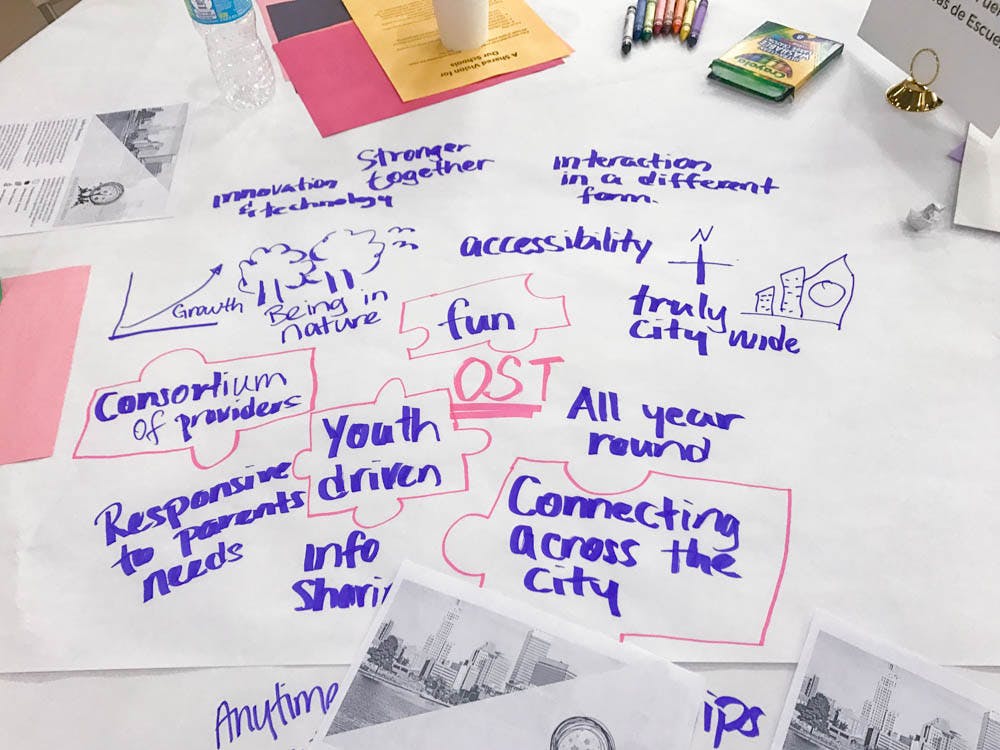Residents and educators of all backgrounds gathered to create a future vision for the city’s education system at the All In: Providence Education Moonshot Summit, April 8.
The event was made possible by support by the Harvard Graduate School of Education, city community members and a $200,000 grant by the Nellie Mae Education Foundation — an organization devoted to educational reforms in New England — according to NMEF Director of Strategic Communications Shaun Adamec.
The summit sought the input of parents, educators and students “to make a citywide commitment to ensuring that all Providence students are successful,” according to a press release from the mayor’s office.
An estimated 450 to 500 people attended the summit, said Mayor Jorge Elorza. Working in groups, community members cited values such as “accessibility,” “community engagement” and “diversity and inclusion” as the foundation for future educational reforms.
“I truly believe we can have the highest performing urban education department in the country,” Elorza said. “I know in order to accomplish that, we need to continue with the steps that we’re taking — but we can’t do it without the community,” he added.
Suon Keo, a student at Classical High School, voiced her concerns with the current education structure, noting that the transition from a lower-performing school to one with more rigorous standards was exceptionally difficult for her, Keo said.
“When I got into Classical, there was a whole new dynamic and cultural shift for me because I wasn’t taught these tactics — how to test-take, how to study or what to study — so it was hard,” Keo said, adding that she would like to see future education reforms alleviate inequalities in Providence’s school districts.
Classical, frequently ranked as one of the top schools in the state, stands above most others in the Providence school district as a magnet school with reading and mathematics proficiency scores more than double the city average, according to 2016 Rhode Island District Report Card education data. By the same metrics, Central High School, located in the same city block as Classical, performed at around half the city average.
“It’s unfair because the environment (at each school) is so different, and when it’s different, there are different levels of expectation,” Keo said. She hopes new teacher trainings will increase awareness of the diverse history and cultural backgrounds of students while also increasing student’s access to emotional support beyond that of a guidance counselor, she added.
“I just wish there could be a better relationship between students and teachers, so they can better understand each other, work together and build a bigger picture within school relations,” Keo said.
Jenny Li ’14, a current educator at Attleboro High School in Massachusetts, spoke about the obstacles that she and many other teachers experience due to the lack of support within the education system. Li hopes more Providence students will be encouraged to invest in the community and go into teaching.
“It’s important to continue holding spaces like this where folks can literally see each other (and) speak to one another ... because so much of that is not encouraged in the school system,” Li said.
Elorza said that input from the crowd would influence future work on the city’s education system. “At the very least, going forward, we are going to make sure we report back to this group to let them know how it’s influenced the work we are doing and continue to do,” Elorza said, praising the summit’s ability to unite Providence residents.
“We want to continue to open up different avenues and pathways for people to engage with us,” Elorza said. “I think there’s going to be a lot of positivity coming from this.”
Correction: A previous version of this article misspelled the name of NMEF Director of Strategic Communications Shaun Adamec as "Sean Adamec." The Herald regrets the error.





